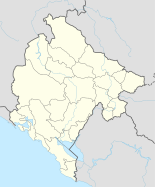Tuzi
|
Tuzi Тузи |
||||
|
||||
| Basic data | ||||
|---|---|---|---|---|
| State : |
|
|||
| Municipality : | Tuzi | |||
| Coordinates : | 42 ° 22 ' N , 19 ° 20' E | |||
| Height : | 46 m. i. J. | |||
| Residents : | 3,700 (2003) | |||
| Telephone code : | (+382) 20 | |||
| Postal code : | 81206 | |||
| License plate : | TZ | |||
Tuzi ( Albanian also Tuz , Cyrillic Тузи ) is a small town in eastern Montenegro . The place is the seat of the municipality of Tuzi , which was founded in 2018 , previously Tuzi had the status of a municipality that administratively belonged to the municipality of Podgorica .
Traditionally, Tuzi is the capital of the Montenegrin part of the Malësia e Madhe landscape . The majority of the population are Albanians.
geography
Tuzi is located ten kilometers southeast of Podgorica on the road and railway line that connects the Montenegrin capital with the Albanian Shkodra .
The place is on the edge of a large plain that extends west and south. The Skadar Lake stretches a few kilometers south of the city . On the eastern edge of the village rise the first hills of the Malësia, which gradually merge into the Prokletije .
population
Tuzi has about 3700 inhabitants (2003). Of these, about 60 percent are Albanians and 37 percent Serbian-speaking (Slavic Muslims and Montenegrins). The numerically strongest denomination are the Catholics , followed by the Muslims, the Orthodox are only a small minority. In the past decade, many residents of the mountain villages have migrated further north to Tuzi.
administration
The villages of Dinoshë (Dinoša), Milesh (Milješ), Vuksanlekaj (Vuksanlekići), Sukruq (Sukuruć), Dreshaj (Drešaj), Narhelm (Pothum), Vrane (Vranj), Lekaj (Lekići) and Rrogâth belong to the soft landscape of Tuzi ).
Although the town belongs to the Podgorica municipality, it has limited self-government rights, its own city parliament and a mayor, currently (2012) Fran Lulgjuraj. In addition to Serbian, Albanian is also the official language. In recent years the Albanian majority has tried several times to achieve the status of an independent municipality for the city and the surrounding villages of the Montenegrin part of Malesija . The Montenegrin government did not respond to such ideas.
history
In the last third of the 15th century, Tuzi was conquered by Ottoman troops. The mostly Albanian, to a lesser extent Slavic tribes in the area were largely able to maintain their independence, although some clans converted to the Muslim faith in the course of time. The tribes lived according to the rules of their archaic customary rights until the beginning of the 20th century. In the course of an Ottoman administrative reform, Tuzi was added to the Vilayet of Shkodra in 1865 . After the recognition of the independence of Montenegro and the redefinition of the borders in the Balkans by the Berlin Congress (1878), Tuzi remained with the Ottoman Empire. In the following decades the place was a border station on the important road from Shkodra to Podgorica.
In 1911 an uprising of the Albanians against the Ottoman rule broke out in the area of Tuzi. The leader of this uprising, Dedë Gjon Luli Dedvukaj, came from Tuzi. He is said to have been the first to use the old flag of Skanderbeg as the Albanian national symbol. While the local population was fighting for Albania's independence, the First Balkan War broke out. In the course of the war, the Montenegrin army tried to conquer the entire region around Lake Skadar, but had to surrender some of the conquests again in 1913 under pressure from the great powers. However, Tuzi has remained part of Montenegro ever since. A Swiss visitor describes his visit in 1914 with the following words:
““ Ten kilometers southeast of Podgoritza, in the area of the Malissor tribe Hoti, is now accessible by car through a road built by the Montenegrins, the small town of Tusi, 65 m. ü. M., with about 800 inhabitants, including those in the immediate vicinity. His name was mentioned a lot when, during the few years before the great Balkan War, the Malissors rebelled against Turkish rule and badly harassed the small Turkish garrisons stationed there. Tusi, in the middle of fields and gardens, rests in a cauldron ... The collapsed minaret next to it was just being rebuilt at the time; ... The place, consisting almost only of a single, large bazaar square with adjoining wooden sales magazines, is guarded by a Montenegrin detachment led by a lieutenant. ""
Sports
The local football club is FK Dečić Tuzi .
Personalities
- Nikollë Nikprelaj (* 1960), singer
- Gjyste Vulaj (* 1977), singer
Web links
- Picture gallery on www.malesia.org
- Brief information about Tuzi (Engl.) ( Memento of 28 September 2007 at the Internet Archive )
Individual evidence
- ^ C. Täuber: My crossing of the north Albanian Alps in April 1914 , in: Yearbook of the Swiss Alpine Club , 50th year 1914 and 1915, Verlag des Schweizer Alpenclub, Bern 1916



